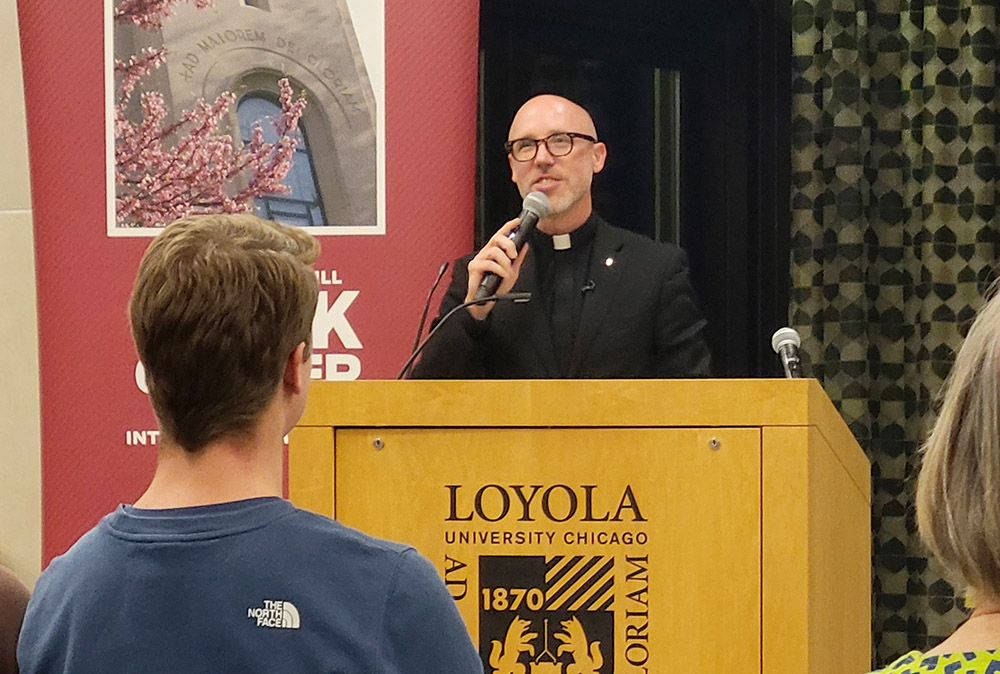
Jesuit Fr. Paddy Gilger speaks Nov. 9 on "The Subject of Public Religion," a talk sponsored by the Hank Center for the Catholic Intellectual Heritage at Loyola University Chicago. (NCR photo/Heidi Schlumpf)
At a time when democracy is in decline and it's difficult to imagine people coming together to even discuss the common good, religious people and institutions can help reconstitute the collapsed public sphere — but not in ways that many think of "public religion" today, said sociologist of religion Jesuit Fr. Paddy Gilger.
In a Nov. 9 talk on "The Subject of Public Religion," sponsored by the Hank Center for the Catholic Intellectual Heritage at Loyola University Chicago, Gilger described the "multiple forces of de-democratization" that are prompting a "steady drip toward a tribalized, post-truth world."
"We see this all over the country and the world, not just in the difficulty we have in crafting legislation or electing a speaker of the House, but even in our laughably common inability to listen to or speak with those who disagree with us or push upon us," said Gilger, assistant professor of sociology and this year's Teilhard Fellow at the Hank Center.
Gilger attributes much of this crisis to what he sees as the collapse of the public sphere, that segment of society — separate from the state and from the private sphere — where an inclusive group of citizens can rationally debate about the good of society at large.
'If we want to practice democracy, it is we ourselves who must become capable of practicing it again.'
—Jesuit Fr. Paddy Gilger
But Gilger sees hope in reclaiming that lost public sphere — and he believes public religion can play a role, despite the perception by many that strongly held religious beliefs contribute to polarization.
"I am confident there are ways we can respond to this crisis. It is not impossible," he said. "There are ways in fact that public religion, of many kinds, can help in reconstructing a plural public sphere and in doing so, help stem the tide of de-democratization, anti-politics, demagoguery and autocracy."
But religions that refuse to accept modernity's separation between church and state are not true "public religions" that can help reconstitute or even participate in the public sphere, Gilger said.
"Not every religion knows how to or seeks to bring its concerns into the public without seeking to reclaim domination," he said. "This is part of what we're seeing right now, with the rise of white Christian nationalism."
Instead, true public religion, while refusing to be relegated to the private sphere, seeks to enter civil society to debate the common good, not to relink its particular denomination with the powers of the state.
Complaints that Catholics are constrained to speak in the public sphere are "greatly exaggerated," Gilger said.
"It doesn't mean that people have to listen or agree," he said. "That is, in fact, the point of the public sphere."
Rather than functioning as a pressure group on the level of institutions and policies, religions can best influence the public sphere through individuals and their actions, Gilger said.
Advertisement
"If we want to practice democracy, it is we ourselves who must become capable of practicing it again," he said. "Yes, we need institutions, but it's not institutions, it's fundamentally us who must change. It's who we are willing to become that determines what we will be capable of giving."
Yet, in order for individuals to be part of morally guided collective action in the public sphere, they need to be "integrated selves," that is, find some identity in a community, rather than exist as "disembedded selves," he said.
Where Gilger sees Catholics best practicing this is in ecclesial movements such as Communion and Liberation, Sant'Egidio and Focolare. Those movements provided the internal formation necessary for public participation through "thick practices" that are "identity-forming" and inculcate a vision of the good life. (There are also "thick practices" untethered from religion and associated with secular visions such as "Ball is life," Make America Great Again, Burning Man or Marvel movies — what Gilger termed "rivalrous spiritualities.")
Gilger described how Focolare, a movement founded in Italy in the 1940s that focuses on unity, practices "embracing Jesus forsaken," which involves refusing to distance themselves from suffering.
Given the importance of these religious practices in shaping public religion, Gilger admitted he was nervous about data showing declining religious participation in religion, but he noted that even lower levels of participation can be inspirational.
He also encouraged those in the audience to think about what practices shape their lives, saying that how they spend their leisure time can be especially illustrative.
Despite technology's propensity to distract, Gilger remains optimistic that the church is offering a response, in particular in the synod on synodality, which is a "practice of learning how to sustain mutual attention on topics we do not agree on."
He said the worst thing that could have come out of the synod would have been any immediate results, on either the right or the left. Instead, learning this process of "mutual attention" is key.
"We have to allow ourselves to be inhabited by the Spirit, which does not mean we'll always agree, but it means we can sustain attention on the same thing," he said. "That's a church."






